Search results
Newest FREE Family Tree Resources
July 21, 2012 by ramona
Filed under Articles, Family Search The LDS, Genealogy Records 101, Latest News
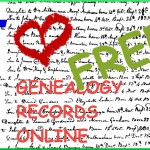 If you have been waiting for new genealogy resources to become available online, your wait may be over. The month of July 2012 saw some great additions to genealogy resources by FamilySearch.
If you have been waiting for new genealogy resources to become available online, your wait may be over. The month of July 2012 saw some great additions to genealogy resources by FamilySearch.
The new additions span the globe from the USA to Asia…some dating from the 1400s.
Keep reading for a complete list of the July’s new records:
| Record For | Record Type | Date Added |
|
United States |
||
| Alabama, Madison County | Chancery and Circuit Court Records, 1847-1950 | 10 Jul 2012 |
| California, San Mateo | County Records, 1856-1991 | 17 Jul 2012 |
| Indiana | Marriages, 1811-1959 | 7 Jul 2012 |
| Maine | State Archive Collections, 1790-1966 | 10 Jul 2012 |
| Missouri, Jackson | County Voter Registration Records, 1928-1956 | 17 Jul 2012 |
| Nevada | County Birth and Death Records, 1871-1992 | 10 Jul 2012 |
| New York, Orange County | Probate records | 10 Jul 2012 |
| Oregon | Douglas County Records, 1852-1952 | 10 Jul 2012 |
| Texas | Deaths, 1977-1986 | 19 Jul 2012 |
| United States | Census, 1940 | 6 Jul 2012 |
| United States | Social Security Death Index | 2 Jul 2012 |
| United States | Civil War Widows and Other Dependents Pension Files | 7 Jul 2012 |
| United States | National Homes for Disabled Volunteer Soldiers, 1866-1938 | 10 Jul 2012 |
| Utah | County Marriages, 1887-1937 | 6 Jul 2012 |
| Utah | Marriages 1887-1966 | 16 Jul 2012 |
|
Canada |
||
| Canada | Census, 1916 | 3 Jul 2012 |
| Nova Scotia | Vital Records, 1763-1957 | 3 Jul 2012 |
| Ontario | Marriages, 1869-1927 | 6 Jul 2012 |
| Quebec | Notarial Records, 1800-1900 | 17 Jul 2012 |
| Saskatchewan | Probate Estate Files 1887-1931 | 6 Jul 2012 |
|
Great Britain |
||
| Scotland | Census, 1881 | 2 Jul 2012 |
| Scotland | Census, 1891 | 2 Jul 2012 |
|
Western Europe |
||
| Italy, L’Aquila, Camarda, Parrocchia di San Giovanni Battista | Catholic Church Records, 1606-1941 | 3 Jul 2012 |
| Italy, Palermo, Diocesi di Monreale | Catholic Church Records, 1531-1998 | 3 Jul 2012 |
| Italy, Trento, Diocesi di Trento, Catholic | Catholic Church Records, 1548-1937 | 21 Jul 2012 |
| Italy, Vicenza, Casoni, Parocchia di San Rocco, | Catholic Church Records, 1597-1937 | 3 Jul 2012 |
| Spain, Province of Sevilla | Municipal Records, 1903-1918 | 10 Jul 2012 |
| Spain, Province of Tarragona | Records of Widows and Orphans of Spanish Officials, 1860-1960 | 10 Jul 2012 |
|
Eastern Europe |
||
| Czech Republic | Censuses, 1843-1921 | 10 Jul 2012 |
| Czech Republic | Land Records, 1450-1889 | 10 Jul 2012 |
| Poland | Roman Catholic Church Books, | 16 Jul 2012 |
| Slovakia | Church and Synagogue Books, 1592-1910 | 19 Jul 2012 |
|
South America |
||
| Chile, Santiago | Collection of Genealogies, 1500-1980 | 11 Jul 2012 |
| Chile, Santiago | Cementerio General, 1821-2011 | 11 Jul 2012 |
| Peru, Lima | Civil Registration, 1874-1996 | 11 Jul 2012 |
| Peru, La Libertad | Civil Registration, 1903-1997 | 2 Jul 2012 |
| Dominican Republic | Civil Registration, 1801-2010 | 11 Jul 2012 |
| Ecuador | Catholic Church Records, 1565-1996 | 2 Jul 2012 |
| Guatemala | Civil Registration, 1877-2008 | 3 Jul 2012 |
| Portugal, Braga | Catholic Church Records 1530-1911 | 11 Jul 2012 |
| Portugal, Castelo Branco | Catholic Church Records | 20 Jul 2012 |
| Portugal, Diocese of Lamego | Catholic Church Records, 1529-1916 | 11 Jul 2012 |
| Portugal, Diocese of Vila Real | Catholic Church Records, 1575-1975 | 11 Jul 2012 |
|
Asia |
||
| Korea | Collection of Genealogies, 1500-2009 | 10 Jul 2012 |
|
South Africa |
||
| South Africa | Free State Dutch Reformed Church Records, 1848-1956 | 19 Jul 2012 |
| South Africa | Orange Free State, Estate Files, 1951-2004 | 11 Jul 2012 |
| South Africa, Western Cape | Various Records | 10 Jul 2012 |
Before you tackle all of these new family history records and break your genealogy brick wall, remember to download your Research tracking forms and Family Tree Charts. Available with your 30-Day FREE TRIAL MEMBERSHIP to Genealogy Beginner
Pinning your Family Tree
July 14, 2012 by ramona
Filed under Articles, Family History, Latest News, Preserving Your Family Tree
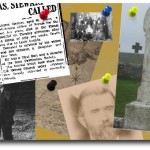 Well it certainly did not take long for family tree fanatics to make use of social media “pinning” sites.
Well it certainly did not take long for family tree fanatics to make use of social media “pinning” sites.
If you are new to social media here is what you need to know about pinning. Pinning is a visual way of sharing your interests via a virtual pin board. You can create boards based on a singular theme such as genealogy, family tree, family history etc. Ultimately, what these sites do is share links through images. One way to think of it is as a visual bookmark.
Pinning for Genealogy
Pintrest
Pintrest can be used as a fantastic tool for organizing your genealogy, sharing resources and following others with like interests. The only catch is that in order to use Pintrest you must first receive an invitation.
Pinspire
If you do not have an invitation to Pintrest, you can try out its identical twin Pinspire. Pinspire is identical to pintrest with one exception…no invitation required.
If you want to check out more pinning sites, Minglewing, Piccsy and Storify are good places to start.
Uencounter.me
The newest kid on the pinning block is Uencounter.me a pinning site with a purpose. Uencounter.me is a mapping site that focuses on letting the user built a visual map of their family tree.
Building a visual map of your ancestors can be a very helpful tool for your family history research. However, the possibilities for information sharing with this type of application are easy to see.
Imagine the map as a resource for finding ancestors by location. Although other search sites come close, if you are not familiar with the geography of the area you are searching… it is easy to become confused and miss something.
For example:
My line of McCallum’s hail from Lanarkshire Scotland can be found in the census at Firth, Carstairs and Carnwath. While that may not mean much on a data screen, having a visual of just how close those communities are, helps give some perspective to your search.
Using Uencounter.me
The process starts by bringing up the map and asking you to zoom into your area of interest. You can also pin a place by adding the address.
Drop down menus let you select:
- Type of Encounter: Genealogy,
- Dates to and from: a date range from the present to the year zero,
- People Here Are / were: ancestors
- This pin relates to: an ancestor
- Specifically: Birth, Marriage, Death, other
For those of you who want to pin live relatives do not worry as the site gives the option for a privacy setting on an individual basis. As you move forward to the next step you will get a pop up box that allows for notes, you can even add photos.
While Uencounter.me shows all the earmarks of a superior genealogy tool, a searchable name function would make this an invaluable free resource for genealogists everywhere.
Need to learn more about finding your ancestors through the geography of genealogy check out Genealogy Beginners lesson on Searching by Place. Available with your 30-day free trial membership.
Genealogy: Online Ethics and Etiquette
July 11, 2012 by ramona
Filed under Articles, Genealogy Standards & Guidelines, Introduction to Genealogy, Latest News
 From the novice to the veteran family historian we can all agree that the vast amount of information available online for genealogy research is a great blessing. Therefore, it is more important than ever to become familiar with the ethical practices and etiquette involved in information sharing when it comes to our family trees.
From the novice to the veteran family historian we can all agree that the vast amount of information available online for genealogy research is a great blessing. Therefore, it is more important than ever to become familiar with the ethical practices and etiquette involved in information sharing when it comes to our family trees.
On sites such as Ancestry.com and Find a Grave, a great deal of the information is made available through the contributions of fellow researchers. Thus, it is becoming easier for genealogy beginners to discover documents and photos at the touch of a few keys.
Family Tree Ethics and Etiquette
Published genealogies can be a truly wonderful resource, they aid us in our own research and quite often lead to the discovery of cousins we never knew we had. The down side of this is that through innocent error and sometimes intent, the genealogical community experiences a degree of unethical behavior and bad manners.
It is very exciting to find published information about your ancestors online however, before you snag that birth, marriage, death record or photo of G.G. Grandma:
1. Ask Permission
This is a common scenario on sites like Ancestry.com where photos and records are often public. This is because Ancestry.com is meant to be a collaborative site and although it states in their Community Guidelines that “Any information you post in our community is public and can be copied, modified and distributed by others” you should still ask permission of the original poster.
2. Give Credit
When using published documents or photos always thank the original contributor A little blurb that reads – Photo Courtesy of Ms. Nice Genealogist – is just good manners.
To learn more about this subject check out Genealogy Beginner’s lesson # 1. Genealogy Standards and Guidelines: You Need to Know This First, available with your 30-day free trial membership.
Find a Grave: Free Family Tree Resource
July 5, 2012 by ramona
Filed under Articles, Genealogy Research Resources, General Tips, Latest News, Sharing Genealogy Information
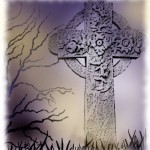 Find a Grave is a FREE genealogical resource that every genealogy beginner should visit and bookmark today.
Find a Grave is a FREE genealogical resource that every genealogy beginner should visit and bookmark today.
Founded in 1995 by Jim Tipton, a self-proclaimed nerd with the odd hobby of searching out and visiting the grave sites of the famous; Tipton’s goal in the creation of the site was to share his interest with like-minded others.
It was not long before he came to the realization that his hobby had great historical and genealogical significance.
What Does Find a Grave Contain?
Filled with memorials this virtual cemetery has listings for:
- North America (by province and state)
- South America
- Europe
- Asia
- Australia and Oceana
- Africa
Not to be forgotten is the “Famous Graves” section that has a comprehensive search field that allows for numerous search types.
It also has some fun categories such as:
Yearly Necrologies: listings of individuals who died during specific times
Posthumous Reunions: a page that lists movies and TV shows with cast members who have passed away. For example when I clicked on the TV show Star Trek, it listed 46 cast members (both guest starts and original crew). For each listing, it gave the date and place of birth and death, a biography that contained many details, cause of death, place of burial and special details.
Interesting Epitaphs: This category is self explanatory and indeed does contain some very interesting epitaphs.
Is it Worth My Time?
The best way to tackle this question is by giving it a test run. For this purpose, I will use three of my ancestors, one from the US, one from Canada and one from Scotland using the broadest search category…surname search.
- U. S. – Undseth: This search did not return any direct line ancestors, however there were a few cousins listed.
- Canada – McCallum: This search found several of my ancestors graves listed in three provinces.
- Scotland – Sinclair: This Search was the most successful and returned numerous family lines from the Orkney Islands.
Find a Grave is most definitely worth your time. In fact, you could easily spend hours and hours searching through the site for burial records to flesh out your family history.
How do I Join?
Joining is easy; simply fill out the online registration and you can immediately begin searching for your ancestors.
Find a Grave is a true genealogy treasure that allows you to not only search for your ancestors but also to contribute to the already huge database. Before you get started, be sure to download your complementary Cemetery Visit Tracking Form available with your free 30-day trail membership to Genealogy Beginner.
Free Genealogy Translation Services
July 2, 2012 by ramona
Filed under Articles, Genealogy Research Resources, Latest News, Sharing Genealogy Information
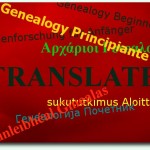 If your ancestors are from Europe, Asia, Russia, South America or another non-English speaking region; you are probably among countless other family tree researchers who will eventually need help translating your genealogy documents.
If your ancestors are from Europe, Asia, Russia, South America or another non-English speaking region; you are probably among countless other family tree researchers who will eventually need help translating your genealogy documents.
Although free online translators have become an abundant resource on the net, when it comes to archaic words, idioms or technical terms they may fall short of expectation.
Live translation services can be costly however; there are some wonderful folks out there who offer genealogy translation services free of charge.
- Linguanaut. Is a site with access to 150 translators, their goal is to connect people in need of a translation with a volunteer translator. To get started just click on Free Translation then choose your language and they will match you up with a translator. (Short non-commercial translations only).
- Freelang: is a fantastic resource with hundreds of volunteers that offers free “short” translations for non-commercial reasons.
To use their service all you need to do is:
- select a language
- select a translator
- fill out their contact form
Your translator will contact you via email with your translation.
- Cucumis: is based on the exchange of services for the benefit of all. This service works on a point system, for example; you can earn points by translating something for another member. However, even if you only speak one language you can still earn points simply by signing up
- WikiTranslation. This site is the simplest to use. All you need to do is fill out their translation request form and someone should get back to you via email.
Of course, there are other language specific services available as well and a quick Google search should give you a list of sites in no time. Happy ancestor hunting.
The Lost Irish: FREE Searchable Database
June 30, 2012 by ramona
Filed under Articles, Genealogy Research Resources, Latest News, Sharing Genealogy Information
 During the nineteenth and early twentieth century, Irish immigrants flocked to North America in droves. Leaving their homeland, due to poverty, political upheaval and famine; or simply to begin anew, they came in hopes of finding a better life.
During the nineteenth and early twentieth century, Irish immigrants flocked to North America in droves. Leaving their homeland, due to poverty, political upheaval and famine; or simply to begin anew, they came in hopes of finding a better life.
Leaving family and friends behind, their only mode of communication with loved ones was by letter. However, the international postal system was just developing and many immigrants lost touch with the folk back home. As a result, many new immigrants were lost to their relatives who remained in Ireland.
Missing Friends
October 1831 marked the birth of a new feature in the Boston Pilot newspaper when an advertisement seeking a Patrick McDermott and his family was published. This advertisement began what later became known as the “Missing Friends” column. The column was an instant success, increasing the newspapers circulation both at home and on an international scale.
A Family Tree Resource
Lasting an amazing ninety years the column ran from 1831 to 1921 and helped countless people find those they had lost. For family history buffs this translates into an amazing FREE resource for finding Irish ancestors. This genealogical treasure contains 40,268 records with text for every advertisement that was placed in the paper.
While the information included varies, it is possible to find some informative facts such as:
- county and parish of birth
- date they left Ireland
- expected port of arrival
- occupation
Using the Database
Although the database has a simple search, the advanced search function allows a great deal of flexibility.
MISSING PERSON’S INFORMATION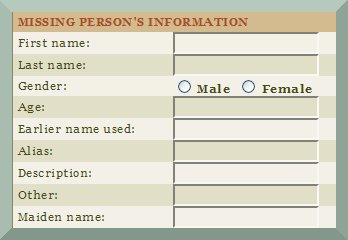 |
Using this search box, I entered the name Patrick O’Brian that returned 452 results. The information returned included:Home County: CorkTownland: Ballydunigan Nr. Bear HavenDeparture date: 1859Port of Departure: England, Liverpool Port of Arrival: MA, Boston |
| Additionally there was a description of the ad placed for him:Any Info Alive Or Dead. Other: Last May (05/65) He Resided W/His Si = Margaret O Brien For About A Mo.; He + His Br. = Denis Started To Mi, Lake Superior + Lived W/Fa + Mo For 6 Yrs; He Got M. About 2 Yrs Ago; Came To Visit His Mo. A Yr Ago Last 4-Jul To Mn Coppermines, Antaugon Co. | |
SEEKING PERSON’S INFORMATION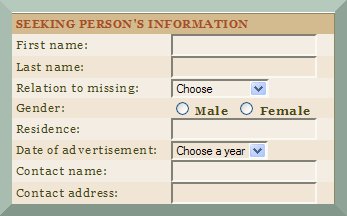 |
The above search also returned the data for the person seeking Mr. O’Brien.Name: Catherine O BrienRelation to missing: MotherGender: FemaleResidence: OH, Youngstown, Mahoning CountyDate of advertisement:08-25-1866 |
POINT OF ORIGIN INFORMATION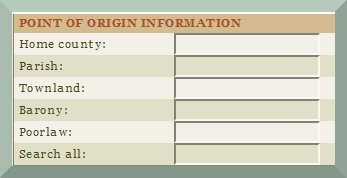 |
The advanced search also lets you search for a person by point of origin.For this search, I used Dublin as my point of origin, which only returned five results. |
WORK HISTORY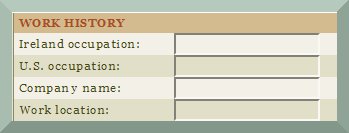 |
If you know your ancestors trade, searching by occupation can give you a wide field of reference.I tried looking for:
|
LOCATION AFTER ARRIVAL |
As many American immigrants first came to North America through Canadian ports, I tried a search for Nova Scotia (A common port of entry for many U.S. immigrants). This search returned 26 results. Under the results was listed Patrick O Donnell, a Shoemaker who after arriving in Nova Scotia travelled to Mo, St. Louis (1859) and ended up in LA, New Orleans |
| The description for Mr. O Donnell reads.M. in Nova Scotia, Halifax (1857); His Wi. = Bridget O Donnell (Borve) in Canada, Quebec Is Anxious To Hear Some Tidings Of Him. Other: Last Heard He Worked at His Trade in LA, New Orleans; At The Time He Left Ns, Halifax He Had A Npw. = John A. Hearns Studying at The Seminary Of Carondolet Nr. Mo, St. Louis | |
TRAVEL INFORMATION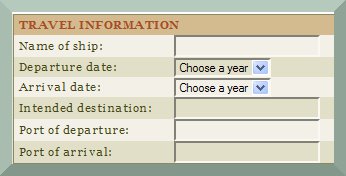 |
Searching by travel information allows you to simply select a year or the intended destination; very handy for researchers who are working with limited information. |
Key Word Search |
The last search field allows you to do a search of the entire database. You can search by name or by keyword. This is very handy should you have an ancestor with an alias or nickname.For example, a search under “Bessy” (short for Elizabeth) returned 55 results including the information for Elizabeth Daily AKA Bessy Daily. |
If you are ready to start searching for your missing ancestor, Boston College searchable database can be found at http://infowanted.bc.edu/.
Before you head off remember to get your Genealogy Beginner family tree charts and research tracking forms available with your 30-day free trial.
Donating Genealogical Records
June 28, 2012 by ramona
Filed under Articles, Latest News, Preserving Your Family Tree
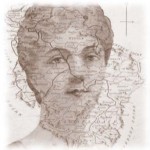 Have no doubt that your family tree research has value beyond the current generations of your own family.
Have no doubt that your family tree research has value beyond the current generations of your own family.
Donating your family history to a local historical or genealogy group is an excellent way to make certain all of your hard work is put to good use. Local Historical Societies and Genealogy groups have a stake in preserving your records for future generations.
How to Donate Your Family Tree
If you are considering donating your family tree research the best place to start is by contacting your local library. Your local library can help you identify the archives that are best geographically suited to receive your family’s story.
Generally, community groups are interested in local reference records. However, they may have ties to other groups with broader interests such as provincial or state archives.
When donating a rather widespread family tree it may be worth considering breaking it into smaller portions focusing on specific locations.
While it is normal in a large family tree to have a significant geographical spread with ancestors coming from all corners of the globe, a local group may have limited space. Therefore, it is reasonable that they may not want to house large documents unless they are completely location specific.
What to Include with Your Donation
Along with your family tree templates or pedigree charts, you should include either originals or copies of:
- Primary and secondary source documents
- Old photos
- Vital Records
- Newspaper clippings
- Maps
Donating your family tree data is one of the best ways of sharing your genealogy and contributing to the preservation of history in your community. Not only does it help preserve your research for future generations it may be key to helping another family history researcher to break down a brick wall.
However, before you donate be sure not to part with any original items you or other members of your family may want to keep. Lastly, make certain that all of your research conforms to The Big Five Genealogy Standards and Guidelines.
To learn more about genealogical standards sign up today for Genealogy Beginner’s 30-day free trial and receive Eight, Step-by-Step Weekly Lessons You Can Do At Your Own Pace. Starting with Lesson 1: Genealogy Standards And Guidelines.
Ancestors in Debtor’s Prison
June 26, 2012 by ramona
Filed under Articles, Genealogy Institutional Records, Genealogy Records 101, Latest News
Prior to 1 869 in Great Britain, individuals who acquired debt could be sent to jail until their debts were paid in full. For many this could be a life sentence, not only for the insolvent individual but also for their entire family.
869 in Great Britain, individuals who acquired debt could be sent to jail until their debts were paid in full. For many this could be a life sentence, not only for the insolvent individual but also for their entire family.
As life without the main provider would most often mean severe poverty for the family of a debtor, entire communities began to spring up inside of debtor’s prisons resulting in children being born and raised inside them.
In the poignant story “Little Dorrit”, Charles Dickens delves into the lives of a family living in debtor’s prison. His inspiration for the tale is rooted in his own experiences, as Dickens own father was sent to debtor’s prison in 1824 for a debt of 40 pounds. Shortly after his incarceration, the rest of the Dickens family with the exception of Charles who at the tender age of 12 was employed and earning money to support his family joined John Dickens.
Although life in debtor’s prison was a harsh existence, there were allowances for debtors living in prisons with their families. A debtor with a little money would be able to pay for freedoms that might allow a prisoner to conduct business and receive social calls. A practice known as ‘Liberty of the Rules’ even allowed some prisoners to live a short distance outside the prison walls.
Debtor’s Prison Genealogy Records
Your best source of British records for finding information on insolvent ancestors in a debtor’s prison is at the British National Archives. This family tree search will take a great deal of patience as the records are not indexed and offer little detail.
Records held in this collection include:
· Registers and indexes of people served with petitions for bankruptcy (1884-1923)
· Bankruptcy case files (c.1759-c.1979)
· Records of Fleet Prison, Marshalsea Prison, Kings Bench Prison and Queens Prison (1628-1862)
· Registers of documents filed in bankruptcy proceedings (1733-1925)
For a quick online search findmypast has a bankrupt directory for 1820-1843 that includes details of all bankruptcies documented in The London Gazette for the period.
Forces War Records
June 23, 2012 by ramona
Filed under Articles, Genealogy Military Records, Genealogy Records 101, Latest News
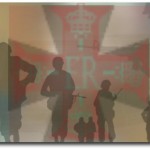 If you are searching for ancestors who served in the British Military Forces, you may want to check out Forces War Records; a new genealogy site that looks to be one of the best-organized search sites of its kind on the net.
If you are searching for ancestors who served in the British Military Forces, you may want to check out Forces War Records; a new genealogy site that looks to be one of the best-organized search sites of its kind on the net.
Forces War Records has over four million records for British Armed Forces personnel.
However, what makes this site special for family tree researchers is its search system. The records are cross-matched with bases, and regiments as well as Ships of the British Armed Forces, providing a usage that is easy to apply, accurate and time saving.
|
The Records Include
|
|
|
World War One World War Two Crimean War Databases Boer War Databases African Wars Databases Indian Mutiny Databases Napoleonic Wars Databases Medal Rolls |
Individual Battle Data Other Wars Casualty Lists Prisoner of War Records Royal Marines Databases Fighter and Bomber Command Losses Fleet Air Arm Data RFC/RAF List RN Losses |
|
Shot at Dawn Database and more !!!
|
|
The site has many cool features including:
- A free search for WWII POWs with information that lists
- Name
- Rank
- Service Number
- Regiment
- POW number
- Camp type/number and location plus notes.
- A free medieval search with search tips
- A community forum
- Tutorials
- A “Memories” section where you can record your own or read stories left by other members.
- Genes Magazine: an online journal that gives access to How to and historical articles.
Some other aspects of the site include the ability to save your searches and bookmark pages to your profile. Of course, registration is required to use the site and there is a reasonable fee for full access to records. Although the fees are reasonable, prospective users should be aware that they are in pounds sterling.
Before you get started on your search at Forces War Records, be sure to download Genealogy Beginners Military Research Tracking Form, available with your 30-day free trial membership.
Politics and Genealogy
June 20, 2012 by ramona
Filed under Articles, Latest News
 For most people genealogy is an enjoyable pastime, a pursuit of our heritage that helps to answer questions about why we are the way we are and how we got here.
For most people genealogy is an enjoyable pastime, a pursuit of our heritage that helps to answer questions about why we are the way we are and how we got here.
However, when it comes to politics and the genealogies of politicians it seems the stakes of knowing your line of decent are a little higher.
Political Family Trees and the Media
The spin that is put on the importance of a politician’s family tree sometimes defies reason. Certainly, it is understandable that the personal history of political candidates should have some bearing. After all the voting public has a right to know just who they are placing in a position of leadership.
Yet it seems curious that the cultural history or ethnicity of a perspective leader’s ancestors should create such media buzz, much less hold sway with the voting public.
Family History Headlines
From the time 35th President of the United States, John F. Kennedy’s Irish decent came into the
spotlight in 1963; genealogy has played a role in politics. 

A great example of this type of speculative Genealogy-gone-wild is the media frenzy surrounding President Barak Obama’s family history. During his campaign and following his 2008 election, countless stories of the president’s ancestors made it onto the pages of distinguished publications, such as the New York Times.
More recently, the news has been filled with a different type of genealogy story and controversy is at the heart of it with genealogists coming out of the woodwork to contest the family tree claims of political hopefuls.
The latest political family tree to come under scrutiny is that of senatorial candidate Elizabeth Warren whose claim to Native American ancestry is being challenged by the Cherokee Nation, the United Keetoowah Band of Cherokee Indians, and the Eastern Band of Cherokee Indians along with Cherokee genealogist Twila Barnes.

Barnes know for her genealogy blog “Polly’s Granddaughter” is a notorious “Wannabe Hunter” who strongly discourages any and all from making claims to Cherokee heritage without first producing the documentation to prove it.
It seems that genealogy and politics has clearly developed a love hate relationship and while it is, being determined if “politics is in the blood”; votes may hang in the balance.
